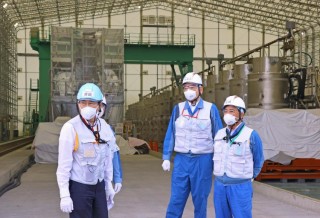Loading
Search
▼ Kishida Vows Safety Over Fukushima Water Release During On-Site Visit
- Category:Other
Japanese Prime Minister Fumio Kishida said Sunday during a visit to the crippled Fukushima nuclear plant that he has urged the operator to prioritize safety ahead of the planned release of treated radioactive water stored at the facility into the sea.
With fishermen remaining concerned over how their businesses could be affected by the move, Kishida also told reporters that he plans to meet with the head of the National Federation of Fisheries Cooperative Associations on Monday.
While Kishida refrained from specifying the exact timing of the start of the water release during the visit, he has been preparing to meet with other Cabinet ministers on Tuesday to make the final decision on the issue, with the end of the month eyed.
"This issue is a challenge that cannot be postponed for the sake of proceeding with decommissioning (of the plant's crippled reactors) and Fukushima's reconstruction progress," the prime minister said.
The final decision will be made after confirming that safety is assured and measures will be taken to address the potential adverse impact on businesses, Kishida said.
Tomoaki Kobayakawa, president of plant operator Tokyo Electric Power Company Holdings Inc., explained to Kishida that the company will launch a project team to oversee departments involved in measures concerning public perception and compensation issues to enable swift decision-making in the top management.
A massive amount of contaminated water has been generated in the process of cooling melted reactor fuel at the Fukushima Daiichi plant since it was devastated by an earthquake and ensuing tsunami in 2011.
The water has been kept in tanks after going through an advanced liquid processing system that removes most radionuclides except tritium, but the storage vessels are nearing maximum capacity. Tritium is known to be less harmful than other radioactive materials, such as cesium and strontium.
The treated water, which contains trace amounts of tritium, will be diluted to one-40th of the concentration permitted under Japanese safety standards before being released via an underwater tunnel 1 kilometer from the power plant.
In addition to local fishermen, some neighboring countries have remained opposed to the plan, with China introducing blanket radiation testing on Japanese seafood imports.
The Japanese government has been considering when to release the water since the International Atomic Energy Agency said in its final report last month that the planned discharge would comply with global safety standards.
© KYODO
- August 20, 2023
- Comment (0)
- Trackback(0)


